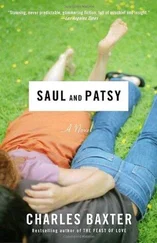“Stop,” the old man commanded. “Cinema is not the writer’s medium but the director’s. All the same, none of those lines is my favorite.” He sat waiting for the doctor to ask him the inevitable question, and when the doctor did so, the director answered, “ ‘Do you know the world’s a foul sty?’ ” After a pause, he said, “ That was my favorite line. I wrote it. It’s not Thornton Wilder’s line; it’s mine. Joe Cotten read it very well. Even the moronic masses got the point that time around.”
“That’s not a very nice line,” the doctor said.
The old man shrugged in response. “Fuck nice. Do you know,” he said, “that even now as we speak, your friend Benny Takemitsu is being mugged elsewhere, nearby, down by the Federal Reserve Building? The perpetrator of this crime is a young idealistic gay man who needs the money for painkilling drugs. He has assaulted this Takemitsu with a baseball bat. In the montage, the baseball bat hits the back of the knee, and we cut to Takemitsu’s face, astonished with pain. Then in a medium shot, Takemitsu falls. Then we see in an insert the assailant’s hand reaching for the victim’s wallet. Your friend will be all right, however.”
“How do you know?”
“The dead know everything,” the director said. “But such knowledge does us no good: we cannot move from our fixed positions. Approaching death and then following it, the camera cannot move. The camera must…never move. For example, you were about to ask me if I would like to walk with you back to your car, for your trip homeward. I cannot. I must stay here on this bench of desolation until my penitence and contrition are complete. I must apologize to the Girl, the one at whom I threw all those birds. I made her a star. There are others to whom I must apologize once they reach this realm. According to the rules written in blood and ink, the rules that reach to the ceiling, I must feel the apologies inwardly. That is the hard part, the inward contrition. With respect to inward contrition, the Jesuits are no help.”
“Why here? Why in Minneapolis?”
“The Girl was born here,” the old man said, “and one’s spirit always naturally returns to the place where one was born. For years I sat by the Thames in London. Now I’m here. I’m not always alone. Benny Herrmann sometimes comes down here to keep me company. We are reconciled, he and I. He wrote music for me. Did you know that he once lived in Minneapolis at the Nicollet Hotel, a few blocks away from here? He composed his opera, Wuthering Heights, a pastiche of Delius, in this city. I never liked it. Don’t tell him. However, most nights I have no company. So I make pictures in my head, as I used to do. And, now, you must leave me, Doctor. You cannot stay.”
“Mr. Hitchcock,” he asked, “will my patient die? The little one?”
“No, not this time,” the director informed him. “There will be a miraculous recovery. In fact, it has already occurred. Her heart has somehow repaired itself, no one knows how, though perhaps your initial diagnosis of damage to the valves was mistaken. Why should anyone question such a recovery, such a miracle? No one ever does. They will not. Music up. We dissolve to happy, smiling faces. Joy abounds. The end, and the final credits,” he said sourly. “Not like many of my pictures, but there you are. So for once, my dear doctor, you will have a happy ending . The scene in the hospital will be directed not by me but by Frank Capra. This case will bring you great renown. You will be cheered. A box-office smash hit, one might say if one were inclined to use such phrases. Henceforth you will be known as a healer with uncanny resources, like a shaman. Well, I must bid you a good night.”
At that moment, the director himself dissolved, leaving behind the odor of cigar smoke and burnt coal. What was brimstone, actually? Just another name for sulfur, with a smell to wake you up, to make your eyes open in astonishment.
—
Dr. Jones rose from the bench and jammed his hat down on his head, lowering himself against the wind as he made his way to his car. Driving home, he saw the souls of the dead wandering about the city. They seemed not to see each other. No one smiled. The dead seemed puzzled by their condition, distracted, preoccupied. They appeared to be dressed in nondescript clothes from Goodwill, although some were naked. Among them ran a few children. None of the women were pretty, or the men handsome. They were beyond all that. Some sat on park benches or stood in bus shelters next to actual living people. The dead were identifiable not because they were semitransp  arent but because they walked several inches above the ground, and they did not reflect light but radiated it, like fireflies.
arent but because they walked several inches above the ground, and they did not reflect light but radiated it, like fireflies.
If I am going mad, Dr. Jones thought, remembering Herzog, it’s all right with me.
Once in the house, he touched the play button on the kitchen’s message machine. A nurse from the hospital had called to say that Dr. Jones should phone the unit as soon as possible. Something strange and quite wonderful had happened. He trudged up the stairs feeling as if he had shed some weight.
On an impulse, instinctively negotiating his way through the nearly perfect dark, he knocked softly on his son’s door before entering. Wearing his boxer shorts, Raphael lay sprawled not under the covers but on top of them, his seventeen-year-old body giving off a sweetly rank boy’s smell, leathery and acidic like that of a horse’s stable. The clock radio blinked on the bedside table, illuminating the poster over the bed of a superhero cheesecake girl who was apparently from another planet. She aimed a weapon-thing at the viewer. Her confrontat  ional breasts pushed aggressively at her vinyl uniform. She had powerful thighs and the scowling face of an angel. Raphael’s tae kwon do awards and cups gleamed and glowed from two shelves across from the window. Dr. Jones gazed at his boy for a minute in the near dark. He could not look at his son in daylight without Raphael saying, “What?” So he watched him now. Minutes passed.
ional breasts pushed aggressively at her vinyl uniform. She had powerful thighs and the scowling face of an angel. Raphael’s tae kwon do awards and cups gleamed and glowed from two shelves across from the window. Dr. Jones gazed at his boy for a minute in the near dark. He could not look at his son in daylight without Raphael saying, “What?” So he watched him now. Minutes passed.
After leaving his son’s room, he knocked softly on his daughter’s bedroom door before entering. Theresa had always been a light sleeper, and, when Dr. Jones entered her room, she awoke and blinked.
“Daddy,” she yawned. She was still usually happy to see him, and she smiled absentmindedly now. “What are you doing in here?”
“Late night,” he said. “I just got home.”
“I was having a dream,” she told him. “I was having it when you came in.”
“A dream? About what?”
“It’s private,” she said. She was fourteen.
“Okay.” He approached her, kissed her on her forehead, and turned around to leave. “Sleep well. Have more dreams, sweetie.”
“Where have you been?” she asked. “There’s that smell.” She wrinkled her nose. She had a disobliging side. “You smell like…” But she appeared to have fallen asleep again before she finished the thought.
After leaving her room, Dr. Jones stood out on the second-floor landing waiting to go into his own bedroom, where he himself would soon be sleeping and where Susan was certainly sleeping now; he could hear her soft reassuring snores. His patient, the one who might actually be in recovery, having suffered a minor miracle, was named Da’neesha, and her mother had said that her daughter loved to dance and wanted to grow up to help people . He bowed his head. He tried to bless his family, his patients, all the afflicted everywhere in the world, but the blessing, being too large and weighing too much, and improbable besides, stayed with him and would not travel.
Читать дальше

 arent but because they walked several inches above the ground, and they did not reflect light but radiated it, like fireflies.
arent but because they walked several inches above the ground, and they did not reflect light but radiated it, like fireflies.










